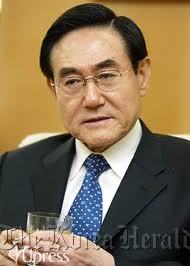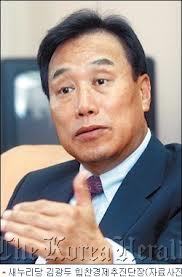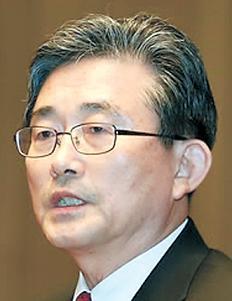
Following is the second in a series of articles on President-elect Park Geun-hye’s key advisers and close associates. ― Ed.
The academic backgrounds of the two key economic policy brains to President-elect Park Geun-hye indicate that the new government will put a priority on growth while promoting “economic democratization” for a fairer economy.
Park’s economic pledges have allegedly been engineered by two economists, both of whom were economics professors at Sogang University, where the president-elect studied electronic engineering in the 1970s.
Kim Kwang-doo, 65, an honorary professor at Sogang University, is one of the closest economic advisers to Park. Kim created the “Institute for the Future of Korea” in 2011 and was involved in the creation of Park’s major economic campaign pledges. He played the same role when Park prepared for the previous presidential election in 2007.
The academic backgrounds of the two key economic policy brains to President-elect Park Geun-hye indicate that the new government will put a priority on growth while promoting “economic democratization” for a fairer economy.
Park’s economic pledges have allegedly been engineered by two economists, both of whom were economics professors at Sogang University, where the president-elect studied electronic engineering in the 1970s.
Kim Kwang-doo, 65, an honorary professor at Sogang University, is one of the closest economic advisers to Park. Kim created the “Institute for the Future of Korea” in 2011 and was involved in the creation of Park’s major economic campaign pledges. He played the same role when Park prepared for the previous presidential election in 2007.

Kim’s core economic policy proposal is on growth-driven economic vitality. To achieve this goal, he developed a set of guidelines for Park’s economic pledges including tax cuts, eased regulations and fair market order.
His economic philosophy originated from the “Sogang School,” which included Nam Duck-woo, 88, a former economics professor at the university. Nam served in the administration of Park Chung-hee, father of president-elect Park, between 1974 and 1978 as a deputy prime minister. Nam developed policies for the nation’s growth-driven economic development. He reportedly introduced Kim Kwang-doo to president-elect Park.
Another economic brain is Kim Chong-in, 72, who chaired the committee on promoting people’s happiness, during Park’s campaign. Kim is also a member of the Sogang School and led its second generation of followers. Kim Kwang-doo is the third-generation leader of the group.
Compared with Nam Duck-woo and Kim Kwang-doo, Kim Chong-in developed a relationship with Park recently. He joined the camp after repeated invitations by Park in November last year. The reason Park made persistent efforts to invite him was because he was the creator of the concept of economic democratization. Kim included the phrase in the Constitution in 1987 as the head of the committee for constitutional revision of economic clauses.

Park needed Kim to adopt it as one of her key campaign slogans in the economic sector. She wanted to have him to improve the image of the Saenuri Party as a “big business-friendly” party.
Action plans for economic democratization from Kim Chong-in included such drastic measures as a ban on both existing and new cross-shareholdings of family-owned conglomerates, or chaebol, in their affiliates.
He has sought structural reform of chaebol, stressing that economic democracy cannot be achieved solely through punishment of wrongdoing. Likewise, regarding chaebol reform, Kim Chong-in differed in opinion from Kim Kwang-doo and other conservative party members.
Park clarified the direction of chaebol reform during the second TV debate on Dec. 10. She said in the debate that, if elected, she would not allow new cross-investments from chaebol and seek economic democratization under the three guidelines ― tax reduction, deregulation and punishment of unfair business practices and corporate crimes. Kim Chong-in later agreed to the alleged “watered-down” chaebol reform measures.
This is why some of industry watchers predict Kim Kwang-doo will take a bigger role in the upcoming presidential transition committee than Kim Chong-in.
On the other hand, Park’s connection to chaebol attracted high interest as she pledged to bring changes to conglomerates’ business practices.
Park is known for not proactively engaging business circles, but she has many chances to build enough channels to talk to the nation’s big business groups as the daughter of former president Park Chung-hee and using a network within the Saenuri Party, which has a number of CEO-turned lawmakers.

When it comes to Park’s inner circle members close to chaebol, economic analyst-turned lawmaker Lee Han-koo and CEO-turned politician Hyun Myung-kwan, 78, former chairman of Samsung C&T Corp., are important figures. Hyun supported Park to develop campaign pledges as a member of the Institute for the Future of Korea.
Party member Rep. Chung Mong-joon, the largest shareholder of Hyundai Heavy Industries, graduated from the same elementary school as Park.
CEO-turned-politician Kim Ho-youn, a former chairman of Binggrae and younger brother of Hanwha Group chairman Kim Seung-youn, has also been linked to Park through a university connection.
By Seo Jee-yeon (jyseo@heraldcorp.com)
-
Articles by Korea Herald









![[Hello India] Hyundai Motor vows to boost 'clean mobility' in India](http://res.heraldm.com/phpwas/restmb_idxmake.php?idx=644&simg=/content/image/2024/04/25/20240425050672_0.jpg&u=)









